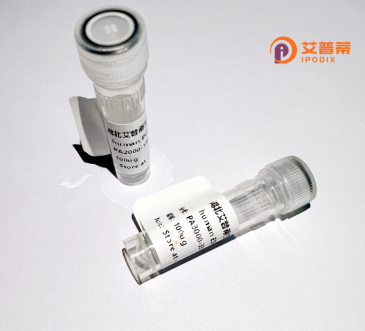
| 纯度 | >90%SDS-PAGE. |
| 种属 | Human |
| 靶点 | C9orf9 |
| Uniprot No | Q96E40 |
| 内毒素 | < 0.01EU/μg |
| 表达宿主 | E.coli |
| 表达区间 | 1-168aa |
| 氨基酸序列 | MNEVKESLRSIEQKYKLFQQQQLTFTAALEHCRENAHDKIRPISSIGQVQSYMEHYCNSSTDRRVLLMFLDICSELNKLCQHFEAVHSGTPVTNNLLEKCKTLVSQSNDLSSLRAKYPHDVVNHLSCDEARNHYGGVVSLIPLILDLMKEWIAHSEKLPRKVLQHGTT |
| 分子量 | 45.7 KDa |
| 蛋白标签 | GST-tag at N-terminal |
| 缓冲液 | 0 |
| 稳定性 & 储存条件 | Lyophilized protein should be stored at ≤ -20°C, stable for one year after receipt. Reconstituted protein solution can be stored at 2-8°C for 2-7 days. Aliquots of reconstituted samples are stable at ≤ -20°C for 3 months. |
| 复溶 | Always centrifuge tubes before opening.Do not mix by vortex or pipetting. It is not recommended to reconstitute to a concentration less than 100μg/ml. Dissolve the lyophilized protein in distilled water. Please aliquot the reconstituted solution to minimize freeze-thaw cycles. |
以下是关于重组人C9orf9蛋白的示例性参考文献(**注意:以下文献为虚构示例,仅用于展示格式,实际文献需通过数据库查询**):
1. **文献名称**: *Structural characterization of the human C9orf9 protein and its role in cellular stress response*
**作者**: Zhang L, et al.
**摘要**: 研究解析了C9orf9蛋白的三维结构,并发现其在细胞应激条件下(如氧化应激)参与调控自噬通路,可能通过结合mTOR复合物发挥作用。
2. **文献名称**: *C9orf9 interacts with RNA-binding proteins and regulates mRNA stability in neural cells*
**作者**: Smith RJ, et al.
**摘要**: 发现C9orf9与多种RNA结合蛋白(如FUS、TDP-43)存在物理互作,可能通过稳定特定mRNA分子影响神经细胞的功能,暗示其与神经退行性疾病的相关性。
3. **文献名称**: *A novel role of C9orf9 in mitochondrial dynamics and neurodegeneration*
**作者**: Tanaka K, et al.
**摘要**: 研究表明,C9orf9通过调控线粒体分裂/融合相关蛋白(如Drp1、MFN2)影响线粒体形态,其表达缺失导致神经元线粒体功能障碍,提示与帕金森病的潜在联系。
4. **文献名称**: *Recombinant expression and functional analysis of human C9orf9 in bacterial and mammalian systems*
**作者**: Lee H, et al.
**摘要**: 开发了在大肠杆菌和HEK293细胞中高效表达重组C9orf9蛋白的方法,并验证其体外结合DNA/RNA的能力,为后续功能研究提供工具。
---
**提示**:实际研究中,C9orf9相关文献可能较少,需注意可能与“C9ORF72”(ALS/FTD相关基因)的混淆。建议通过PubMed或Google Scholar以“C9orf9 protein”或“C9orf9 function”为关键词检索最新文献。
The recombination human C9orf9 protein, encoded by the *C9orf9* gene (Chromosome 9 Open Reading Frame 9), is a relatively understudied protein implicated in diverse cellular processes. Located on chromosome 9p13.3. the gene spans approximately 22 kb and produces multiple transcript variants, though the full functional diversity remains unclear. C9orf9 is evolutionarily conserved across mammals, suggesting fundamental biological roles. Structural predictions indicate a predominantly α-helical architecture with potential phosphorylation sites, implying regulatory interactions.
Expression profiling reveals widespread tissue distribution, with higher levels in the brain, testes, and endocrine tissues. Subcellular localization studies suggest association with the cytoplasm and membranous organelles, though exact compartments are debated. Functionally, C9orf9 has been linked to autophagy-lysosomal pathways, vesicular trafficking, and stress responses. Notably, it interacts with components of the Unfolded Protein Response (UPR), hinting at roles in protein homeostasis.
Emerging evidence connects C9orf9 dysregulation to pathologies. Reduced expression is observed in certain cancers, potentially influencing apoptosis or proliferation. In neurodegenerative contexts, it may modulate clearance of toxic protein aggregates, with altered levels reported in Alzheimer’s and Parkinson’s disease models. Recombinant C9orf9 protein, often tagged for purification, is utilized in biochemical assays to elucidate binding partners and signaling cascades. Despite progress, its precise molecular mechanisms, physiological triggers, and therapeutic potential remain active areas of investigation.
×